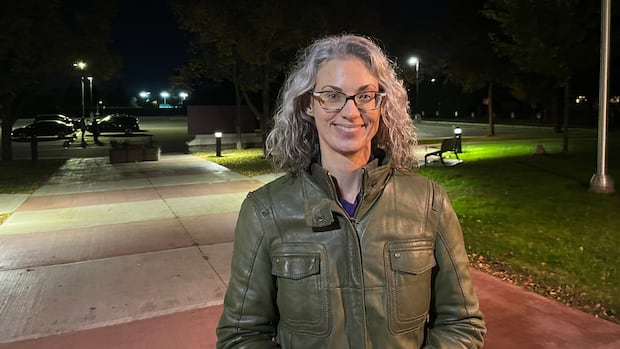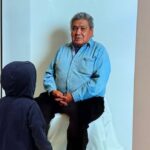OttawaWhen Cathy Varrette learned she could no longer tune in to the Ottawa-Carleton District School Board’s committee meetings, she decided she’d try to livestream them on her own.Province made decision, saying meetings shouldn’t be a forum for ‘political commentary’Cathy Varrette decided to film an Ottawa-Carleton District School Board committee meeting on Wednesday after the province announced that committee meetings would no longer be livestreamed. (Liam Baker/CBC)Cathy Varrette is a regular on livestreams of Ottawa-Carleton District School Board (OCDSB) committee meetings.She holds watch parties with a group of parents. They have special-needs children and follow the board’s special education advisory committee. The online broadcasts had given Varrette the chance to duck out for her child’s bedtime. But that all came to an end this week, as the provincial education ministry forced school boards now under their supervision to stop streaming committee meetings.So Varrette decided to go in person on Wednesday evening and film the OCDSB meeting herself. But after proceedings began, she was told that wasn’t allowed. She wasn’t happy.“If we don’t fight this, we lose our transparency,” she said. “Our transparency and our ability to participate has been taken away by the province, so that’s why I had to come and that’s why I had to livestream.”The board said she was initially blocked from filming under a separate policy that requires consent for recording. The committee took a break for consultations, and after everyone consented, she was allowed to resume.But a board spokesperson said livestreaming any recording — by the public or the media — still isn’t allowed.That policy, along with the end of the board’s own feed, is prompting questions about transparency and accessibility.The livestream ban raises human rights issues since only having in-person meetings can create barriers for people with disabilities, said Anthony Wong, a parent and committee member.“It’s really important that people with various disabilities, and the public in general, have access to the communications of the meetings,” said Wong, who is also co-chair of the Ottawa-Carleton Assembly of School Councils.“People want to be able to participate, and they’re not always able to come to the meetings in person.”Varrette says having access to the OCDSB’s livestreams allowed her to duck out around her child’s bedtime. (Gabrielle Huston/CBC)Education minister says move keeps meetings focusedBut Education Minister Paul Calandra defended his decision, saying the top priority of the supervisors he appointed is student success. He suggested that the meetings have instead become a venue for grandstanding.“I made this decision to maintain meetings that are productive, professional, and focused on improving student success and achievement, rather than serving as a forum for political commentary,” Calandra said.“At the same time, I ordered all meetings to remain open to the public with hybrid participation options with public posting of agendas, minutes, and decisions.”A ministry spokesperson said that media will not be prevented from recording the meetings. The decision only concerns the livestreams.Education Minister Paul Calandra defended the decision to end livestreaming, arguing that the meetings had become venues for grandstanding. (Spencer Colby/The Canadian Press)Chandra Pasma, MPP for Ottawa West-Nepean and the NDP’s education critic, said the decision only serves to keep parents in the dark. “In these boards that are under supervision, these committee meetings are the only things that are still happening in a public forum where parents can still see what’s going on,” she said. “The fact that they’re trying to shut even that down just shows the lengths that they will go to to make sure that we can’t be involved in the decisions affecting our kids’ education.”Pasma said closing livestreams of the special education advisory committee is particularly concerning, given that care needs make it more difficult for parents to attend in person.“Being able to part or view the meeting from home was an important accessibility factor for these parents,” she said.”And now they’re being told, sorry, unless you have the freedom and capacity to travel in person, you don’t get to know what’s going on.”CBC asked for an interview with the OCDSB supervisor Robert Plamondon, who has previously declined interview requests. He did so again for this story.ABOUT THE AUTHORArthur White-Crummey is a reporter at CBC Ottawa. He has previously worked as a reporter in Saskatchewan covering the courts, city hall and the provincial legislature. You can reach him at arthur.white-crummey@cbc.ca.
Wednesday, 4 Mar 2026
Canada – The Illusion
Search
Have an existing account?
Sign In
© 2022 Foxiz News Network. Ruby Design Company. All Rights Reserved.
You May also Like
- More News:
- history
- Standing Bear Network
- John Gonzalez
- ᐊᔭᐦᑊ ayahp — It happened
- Creation
- Beneath the Water
- Olympic gold medal
- Jim Thorpe
- type O blood
- the bringer of life
- Raven
- Wás’agi
- NoiseCat
- 'Sugarcane'
- The rivers still sing
- ᑲᓂᐸᐏᐟ ᒪᐢᑿ
- ᐅᑳᐤ okâw — We remember
- ᐊᓂᓈᐯᐃᐧᐣ aninâpêwin — Truth
- This is what it means to be human.
- Nokoma











